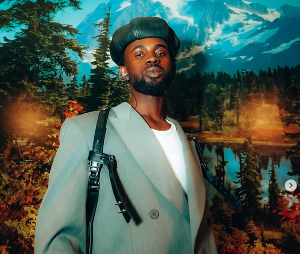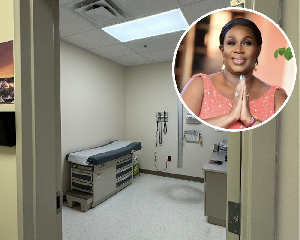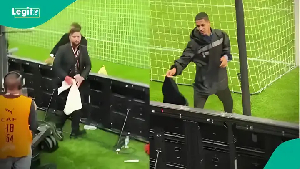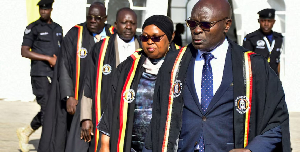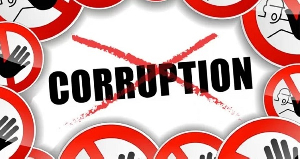Opinions of Wednesday, 3 July 2013
Columnist: Ata, Kofi
Is the Supreme Court a Victim or Villain?
By Kofi Ata, Cambridge, UK
The Supreme Court (panel of nine Justices) hearing the 2012 Presidential Petition has come under criticisms over the past week for not only its reluctant to crack the whip but also for cracking it (the high handedness) in dealing with recalcitrants who disregarded its final warning. The sentencing of NPP Deputy Director of Communications to a ban from attending the hearing and the issuance of directives to others to appear before the court on July 2, 2013 for contempt of court have raised eye brows and even necessitated accusations of intimidation and threat to freedom of expression and free press. Currently, there is a petition before the Chief Justice to intervene or order the nine Justices to stop hauling citizens before it to answer charges of contempt of court (see “Petition to the Chief Justice of Ghana”, and “Contempt Row: Chief Justice Petitioned to Restrain Supreme Court”, Ghanaweb, June 29, 2013). A number of articles expressing different views on this subject have been written, including “Is Supreme Court Curtailing Freedom of Expression?” (Ghanaweb, June 30, 2013). This article is a contribution to the debate and to analyse the factors that led the Supreme Court to take measures that appear draconian and generated controversy.
Among the cardinal duties of the judiciary and judges is the administration of justice. For judges, it is also their prime responsibility to ensure that, not only the outcome of administration justices is fair but equally, the procedure or process itself. Though there is a general perception that “the end justifies the means”, that may not be necessarily applicable in judicial matters because it is the input that determines the outcome. For this reason, the nine Justices have a duty to the nation and all the parties involved in the petition to ensure that the trial is fair in order to achieve the objective of administering justice.
For fair trial and the avoidance of outside influence through comments and discussions by the public including the media in prejudicing a case before a court and either causing mistrial or miscarriage of justice, in certain limited instances, especially, in serious criminal cases the trial judge/s may impose reporting restrictions. This is normally done by either a ban on reporting the whole or certain aspects of the hearing or specified evidence and witnesses being identified through the issuance of reporting guidelines prior to or during the hearing.
Considering the political temperature in Ghana at start of the petition and the importance of this case, my view is that to stop potential and real contempt of court, the SC should have given some reporting guidelines to the media and the public, though that might have been difficult to achieve since the hearing is live on radio and television. Even if that was unrealistic, could the Justices have followed the Kenyan Supreme Court example by cautioning members and supporters of the two main protagonists (NDC and NPP) from conducting their own trials in the courts of public opinion?
I believe that the Supreme Court had good intention by not providing any reporting guidelines or issuing any restrictions on comments and public discourse on the hearing but relied on the trust of the people to respect the common law of contempt of court. As Lord Justice Lloyd observed in Attorney-General -v- Newspaper Publishing plc [1987] 3 All ER 276; [1987] 3 WLR 942. "Since the test of contempt is not a breach of the order but interference with the administration of justice, it follows that at common law a contempt may be committed if no specific order has been made by the court affecting anyone other than those involved in the proceedings".
Unfortunately, Ghanaians do really like enjoying their new won freedom of expression and free press to the full and would want to stretch and test the boundaries of the two guaranteed under the 1992 Constitution but denied them until Nana Akufo-Addo, as Attorney General under the Kufuor government restored, even if that sometimes led to confusion or anarchy. Sadly, the benefit of the doubt exercised by the Justices did have negative effect right from the very beginning of the hearing when the General Secretaries of NDC and NPP competed against each other on daily basis to gain the notoriety as the best spin doctor in peddling falsehood at the end of the day’s hearing. Coupled with daily commentaries by political propagandists on radio and television discussion programmes across the country as well as those of us who discuss the case and court proceedings through regular articles on the electronic media and social networks, there was high risk of contempt of court with the exuberance enjoyment of the freedom of expression and of free press.
Rightly or wrongly, the Justices did not see the need or urgency to curtail this behaviour outside the court room in the early days. Within the confines of the court room, lead counsels from the two main contestants representing the petitioners, first and third respondents resorted to the use of unethical and abusive language. Though warnings were issued, no sanctions were applied by the Justices. What appears to have broken the camel’s back was when some of the outside court room comments and criticisms became direct attacks on the integrity of the Supreme Court and individual Justices, particularly, the presiding Justice.
Then, the final warning was extended outside the court room to cover all and sundry just before the court adjourned proceedings for two weeks to give KPMG time to complete the pink sheets audit. When sitting resumed on June 24, 2013, the Justices repeated their final warning and specifically indicated that it even covered the President of the Republic and were ready to use their full powers to crack the whip, which hitherto, they had willingly or reluctantly shy away from until that fateful day of June 26 when Sammy Awuku became the first victim, villain or sacrificial lamb.
The now Sammy Awuku Supreme Court episode has generated a lot of soul searching in Ghana, particularly, whether the actions and omissions of the nine Justices was to silence public discourse on the case and a direct or indirect threat to freedom of expression and free press, which the judiciary is under obligation to protect. Has the Supreme Court been pushed to the wall and left with no other alternative but to act as it so did or is the court resorting to this high handed approach to compensate for its past lapses in cracking the whip earlier? In other words, is the Supreme Court, a victim of it flexibility and reluctance to exercise its judicial authority earlier or a villain for its failure to crack the whip earlier?
I do not intend to answer the above questions for good reasons. I have been observing some of the weekly proceedings from afar and from the Ghanaian media, some of which are equally guilty of contempt of court. Again, being outside Ghana, my understanding of the current environment (political, economic, social, etc) is from second sources, some of which are unreliable or biased or both. Notwithstanding these, it is not mistaken to opinion that because of the competing interests at stake, the very nature of this case; the risks of free range comments and criticisms, the peddling of propaganda falsehood for political gains and the potential to undermine the credibility of the panel as a whole or some members and thereby erode the confidence and trust of the public in the Supreme Court; the potential for rejection of the final verdict by the losing party and the unpredictable consequences that could follow, the Justices should have managed the procedural matters better by issuing guidelines and cracked the whip earlier.
At the same time, one could not blame the Justices for being flexible and not overly high handed in the exercise of their powers of sanction too early. They would have been accused of abuse of powers and breaching the constitution or the constitutional rights of citizens. I am sure that the Justices’ initial flexible approach to contempt of court was to give all parties a fair chance to prosecute and or defend their respective claims. The relaxing and friendly atmosphere also demystified the Supreme Court or court proceedings that inured to the benefit of majority of Ghanaians who were alien to court proceedings. But considering where we are now, was it worth it?
I am of view that the flexibility approach as far as outside the court room is concerned was worth it because the decision of Supreme Court to allow the live coverage of the proceedings. The live coverage indeed, exposed both NDC and NPP propaganda machinery. In fact, had it not been the live broadcast, the two parties would have misled the public and their fundamentalist members and supporters and whipped them into acts and omissions that could have further heightened tensions in the country. On the other hand, the failure to crack the whip earlier in the court room directly contributed to the contemptuous acts and omissions outside the court room that led to the present predicament. Had the whip been cracked earlier in the court room, it would have sent a warning to those outside to have exercised restraint with their comments and criticisms, therefore ensuring self-regulation and avoided the current situation that appears to be imposed regulation, which is being regarded as threat to freedom of expression and free press. In other words, the Supreme Court is both a victim of its own making (be it success or failure). They found themselves between a rock and a hard surface.
Though the petition is a novelty and could even be extraordinary and therefore reasonable to expect that it may require extraordinary measures to deal with matters arising therefrom, the nine Justices must act with candour and caution to avoid any potential breach of constitutional rights, particularly since they are the final watchdog on protecting and safeguarding the enjoyment of rights and freedoms enshrined in the constitution. For example, the sentence imposed on Sammy Awuku is problematic not only because he did not appear to have had a fair hearing (though courts have powers to sentence people who commit contempt of court without necessarily a formal trial during the hearing and especially, after the issuance of court restrictions) as stated by Lord Justice Lloyd the case referred to earlier “At common law, if the court makes an order regulating its own procedure and the purpose of the order is plainly to protect the administration of justice, then anyone who subverts that order will be guilty of contempt the indeterminate nature of the sentence imposed on him could not be justified in law”.
In the Linnett v Coles [1987] QB 555; [1986] 3 WLR 843, when the appellant was ordered to be committed to prison 'until further order', Lord Justice Lawton (of the Queen Bench Division) held that “with regard to Contempt of Court Act 1981, Section 14(1) and Administration of Justice Act 1960 13(3), such an order was unlawful. A committal had to be for a definite period”. No one knows when the presidential petition hearing will end and so Sammy Awuku has in effected, been sentenced to indefinite period.
In conclusion, wherever side you are in this ongoing Supreme Court saga and whether you consider the predicament as avoidable or not, whether the Supreme Court is a victim or villain of its own making, let’s the Supreme Court Justices and especially, the Chief Justice tread with care and caution in order to sustain the sanctity and authority of the Supreme Court as a whole. Whatever action that is or not taken in resolving the petition as well as the consequences therefrom and thereafter, it must done with only one objective in mind. That is, the common good of strengthening and deepening Ghana’s democratic and constitutional institutions to safeguard and maintain the peace and security of the State.
Kofi Ata, Cambridge, UK
Entertainment
